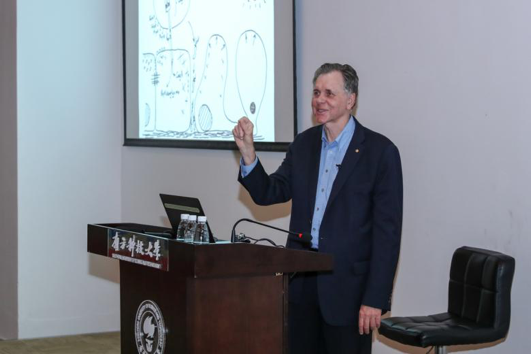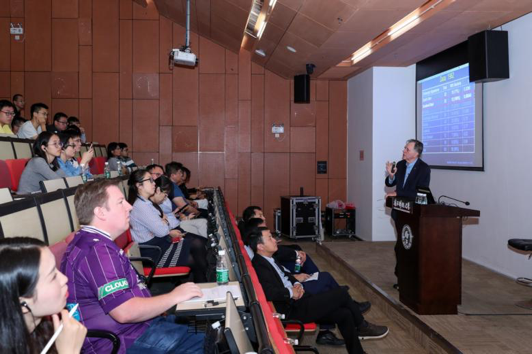On March 27th, the Nobel Prize Winner in Physiology or Medicine, Professor Barry Marshall came to Southern University of Science and Technology (SUSTech) and gave an insightful report sharing how he discovered the role of helicobacter pylori (H. pylori) in causing stomach ulcers. SUSTech Vice President Lu Chun presided over the lecture, which was the 214th lecture in the SUSTech Lecture Series. Professor Marshall was a big draw for many teachers and students, with the Lynn Library Lecture Hall filling up and overflowing into the aisles.

Professor Marshall, known as the father of H. pylori, proved that it is the leading cause of most stomach ulcers and gastritis. Professor Marshall won the Nobel Prize in Physiology or Medicine in 2005 with collaborator Dr Warren. Their Nobel Prize in Physiology or Medicine was “for their discovery of the bacterium helicobacter pylori and its role in gastritis and peptic ulcer disease.” Professor Marshall was elected a foreign academician of the Chinese Academy of Engineering in 2011. In 2014, he was awarded the China Government Friendship Award (China’s highest honor for foreign experts).

He first introduced the painstaking process of discovering H. pylori. At that time, it was believed that high acid environment of the stomach meant that no bacteria could survive. It was also believed that gastric ulcers were mainly caused by stress, irritating food and hyperacidity. During his research into H. pylori, Professor Marshall and his team put forward that it was the direct cause of stomach disease, which suffered a lot of suspicion and denial from the medical community. In order to prove his point of view, Marshall volunteered his own body to finally prove his hypothesis, and the cause of stomach disease.
Professor Marshall subsequently explained why H. pylori is not attacked by the immune system. He also used several patients as examples to introduce the gastric cancer caused by H. pylori. Data shows that such disease attracts global attention, but with the attention of various countries, the mortality rate is decreasing year by year.
In the Q&A session, teachers and students asked many questions about the detection and dissemination of H. pylori, and Professor Marshall gave detailed answers one by one.
Proofread ByChris Edwards, Xia Yingying
Photo ByZhang Xiaoyan, Student News Agency Tian Ye